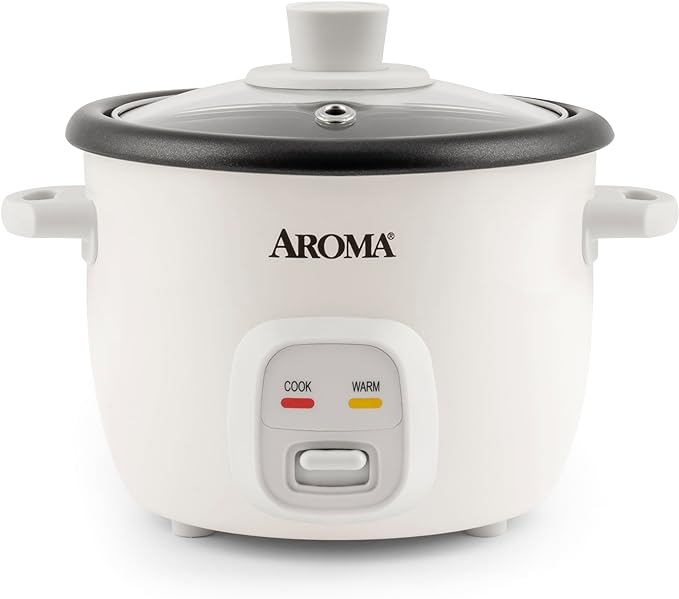What a mess! The rice cooker’s boiled over, and now your rice cooker and the countertop are covered in a sticky, starchy film. It’s annoying and frustrating but completely preventable.
To prevent your rice cooker from boiling over, make sure you’re using the right amount of water for the amount of rice you’re cooking. If that doesn’t resolve the issue, then also make sure you are sufficiently pre-rinsing your rice. You can also try adding oil or using a different type of rice.
If you’re still having trouble with your rice cooker boiling over, you’re not alone. It’s a fairly common problem. Keep reading to learn how to keep your rice cooker from boiling over once and for all.
Table of Contents
How to Stop Rice Cooker Boiling Over
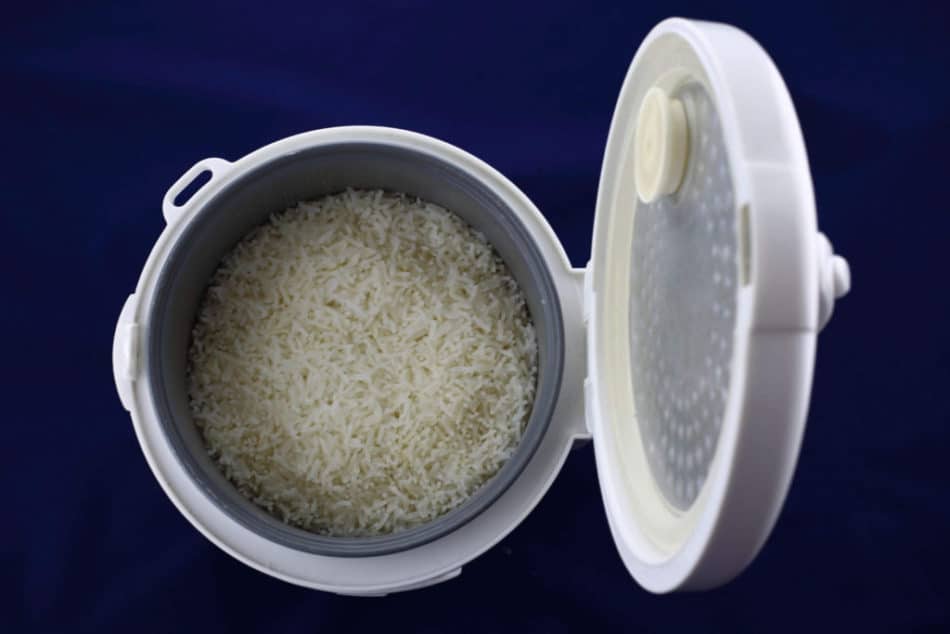
There are several different things you should try when attempting to keep your rice cooker from boiling over. Let’s take a quick look at them now before we go more in-depth:
- Make sure you’re using the right amount of water and rice according to the rice cooker’s instructions. If it’s still boiling over, you can try reducing the amount of water.
- Rinse your rice with cold water until the rice runs clear.
- Add a tablespoon of olive oil, coconut oil, or butter during cooking or spray the top of the rice with cooking spray.
- For small spills, place a paper towel over the hole in the rice cooker’s lid or place the rice cooker on a cookie sheet.
- Try a different kind of rice.
Any of these things could solve or reduce the problem, let’s take a closer look at how you can implement each of these potential solutions.
1. Adjust the Amount of Water in Your Rice Cooker
One of the most likely reasons that your rice cooker is boiling over is that there is too much water for the amount of rice being cooked.
But how much water do you need for rice? It’s not as complicated as you might think. Cooking rice isn’t like baking. You’ll see all sorts of answers online recommending a certain ratio depending on the type of rice you’re using, but a little more or a little less will still yield perfectly edible rice.
Your rice cooker should have come with a manual that recommends a certain amount of water for each “cup” of rice you put in the cooker. It is important to note that the cup that comes with rice cookers is usually not an actual cup’s worth of rice. It is usually more like three-quarters of a cup.
We recommend following the directions that come with your rice cooker exactly and seeing if that fixes your boil-over woes. If it doesn’t solve the problem, you should try adjusting the amount of water.
If you threw your rice cooker’s instructions away, or if you just can’t find them, it’s typically pretty easy to find a digital copy of the instructions online. I would start by googling something like this:
[Brand name] [Model name] rice cooker instructions.
This almost always works for me when I’m looking for lost instructions for a kitchen appliance. However, if that doesn’t work, you can also try the following:
- If you bought it online, go to the retail website where you bought the rice cooker (e.g. Amazon.com, Walmart.com, etc.), you can often find the instructions saved as an attachment on the product page
- If that doesn’t work, you can look on the manufacturer’s website and either find the instructions there, or request a digital copy through their “contact us” form or email address
Now, here are some tips you can try when reducing the water you add.
Ways you can reduce the amount of water in your rice cooker:
- Reduce the amount of water by half a cup or a whole cup at a time. You need enough water so the rice cooks properly, so don’t reduce too much.
- Reduce the amount of water so that the water just covers the rice. This is the absolute smallest amount of water you want to put in the rice cooker. It may not properly cook all types of rice.
- Reduce the amount of water so that when you rest your finger on the top of the rice, the water reaches your first knuckle. (This is a tried and true traditional method, but it might not work if you have very long fingers.)
2. Rinse Your Rice Before Cooking
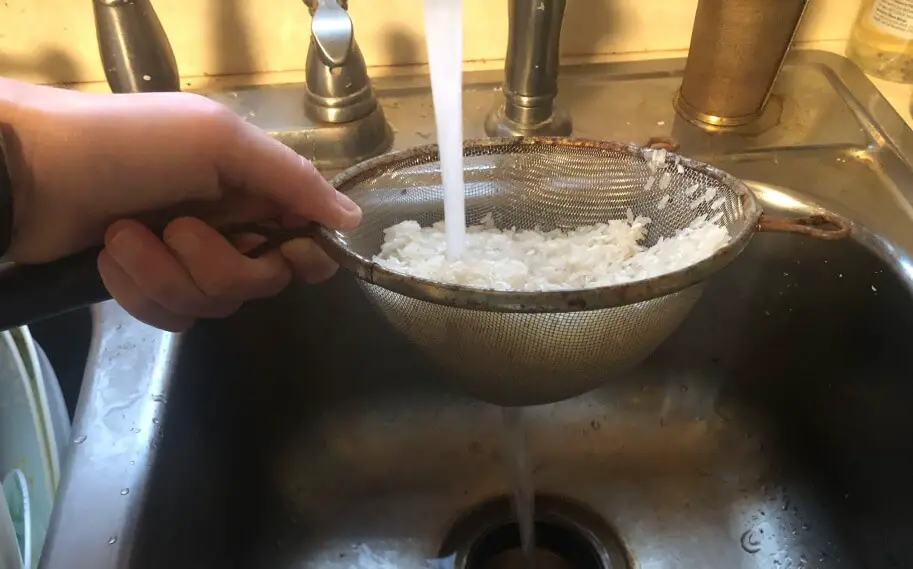
Rinsing rice is an important part of making the perfect, fluffiest, and most nourishing rice. Rinsing rice removes the excess starch which is the reason you get those nasty-looking bubbles pouring out of the vent in your rice cooker.
There are basically two ways to go about rinsing your rice.
- Run water over the rice: Pour the amount of rice you want to cook into a fine-mesh strainer and allow water to run over it until the water runs clear. You will remove more starch if you swirl your hand around in the rice so that the grains rub against each other.
- Put the rice in a bowl of water: Place the rice in a bowl and fill the bowl with water. Swirl the rice around with your hand. Drain and repeat until the water is clear.
We prefer the second method, as do many regular rice cookers, because it seems to waste less water and do a more effective job of removing starch.
With the starchiness removed, your water will be less likely to boil up and out of the rice cooker! This step alone solves many people’s rice cooking woes, including gummy rice.
It’s also interesting to note that rinsing rice can reduce the arsenic levels in the rice according to Scientific American.
3. Add Oil or Butter to the Rice
Adding a few drops of oil or butter to rice helps keep the grains of rice from sticking together, but it also weighs down some of that frothy bubbling action that can happen even with the best-rinsed rice.
We recommend the following sources of fat for rice mostly due to the flavors they impart:
- Coconut oil: Not only is this one of the healthier options, but it gives the rice a hint of coconut flavor that pairs nicely with many Asian-inspired dishes.
- Olive oil: This is another healthy option, but it has a more neutral flavor compared to some of the other options.
- Butter: Buttery rice is delicious, of course. If you already intend to put butter on your rice, this would be a great option.
Although seasoning rice with sesame oil is a great way to prepare rice, it is not best to cook rice in sesame oil as it tends to burn easily.
This tip is also a great way to keep pots from boiling over on the stove or even water boiling over in your slow cooker.
4. Protect Your Counter for Easy Clean Up
If your rice cooker is still boiling over, you can be more proactive about handling the mess. As long as the rice comes out cooked, then the boiling over is just an inconvenience.
Here are some options that may work with your rice cooker:
- Place a cookie sheet under the rice cooker to keep the mess off your countertops. You’ll still have to clean the cookie sheet and the rice cooker, but it makes cleaning up a little easier. This is a great option if you only experience boiling over occasionally.
- Place a paper towel over the vent. The paper towel will not create an airtight seal, so your rice cooker will still be able to vent, but it will catch a lot of the water and starch as it comes out. This will only work if your rice cooker only bubbles out in small quantities.
Be wary of placing your rice cooker on a thick towel or in something that does not provide a level surface or stability. Most rice cookers work best when the cooker is level, and you don’t want it tipping over!
5. Try a Different Kind of Rice
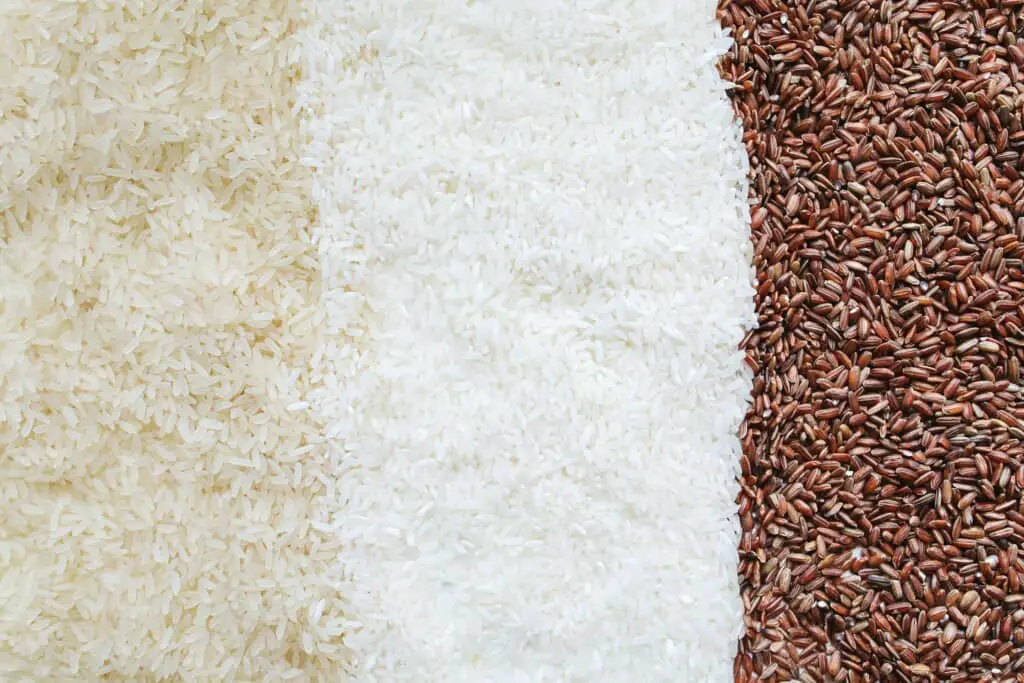
If you’ve tried tips 1-4 above already, and it hasn’t stopped your rice cooker from boiling over, then try using a different kind of rice.
How rice cooks and the amount of starch it contains varies depending on the style. White rice, for example, tends to have less starch than brown rice. brown rice will need to be washed more thoroughly to remove as much starch as possible.
Sticky rice and short-grain rice also tend to have a lot of starch.
Branch out a little and try something new. Long-grain rice like Jasmine rice will go with any meal, and it is less likely to cause boiling over due to the starch content.
6. Ensure the Rice Cooker Seals Properly
Another reason why your rice cooker might boil over is because it isn’t sealing properly.
The seal on the rice cooker traps the steam during the cooking process. An incorrect seal can cause your rice to cook improperly and it can cause that sticky rice water to leak out the sides.
There are two reasons why your rice cooker might not be sealing properly, first, your rice cooker seal is worn out.
If this is the case, you might be able to buy a new seal from the manufacturer. But, a better solution might be to buy a new rice cooker.
Second, your rice cooker might not seal properly if the seal is not clean. Make sure you clean your seal thoroughly after each use of your rice cooker.
Left behind residue on the seal can prevent it from sealing fully which could cause the rice cooker to boil over.
7. Use a Different Heat Setting
Some rice cookers have multiple heat settings, cooking rice at too high of a heat setting can cause it to boil over.
If you can adjust the heat setting of your rice cooker, try to cook your rice on a lower heat setting. This will reduce how fast the steam builds up which can help prevent it from boiling over.
Rice should always be cooked at a low heat for a longer period of time.
If you have tried all seven of these tips and your rice cooker is still boiling over, it may be time to replace your rice cooker.
When To Replace Your Rice Cooker
Try these five methods to prevent your rice cooker from boiling over. It’s likely that one of them (or a few of them in combination) will fix your issue.
However, if after trying all of the above tips, your rice cooker is still boiling over regularly, then you should consider replacing it.
Rice cookers are generally pretty inexpensive, and if it’s causing you a lot of trouble/stress, then it might be worth it to buy a new one.
Here is a good option for a rice cooker available on Amazon that has lots of great reviews.
Aroma Housewares 1 qt Rice and Grain Cooker (See on Amazon)
If you do decide to buy a new one, it would be a good idea to check the reviews of the new model you’re considering buying, to see if boiling over is a common problem or only an occasional issue (which could point to user error).
Why Does a Rice Cooker Boil Over?
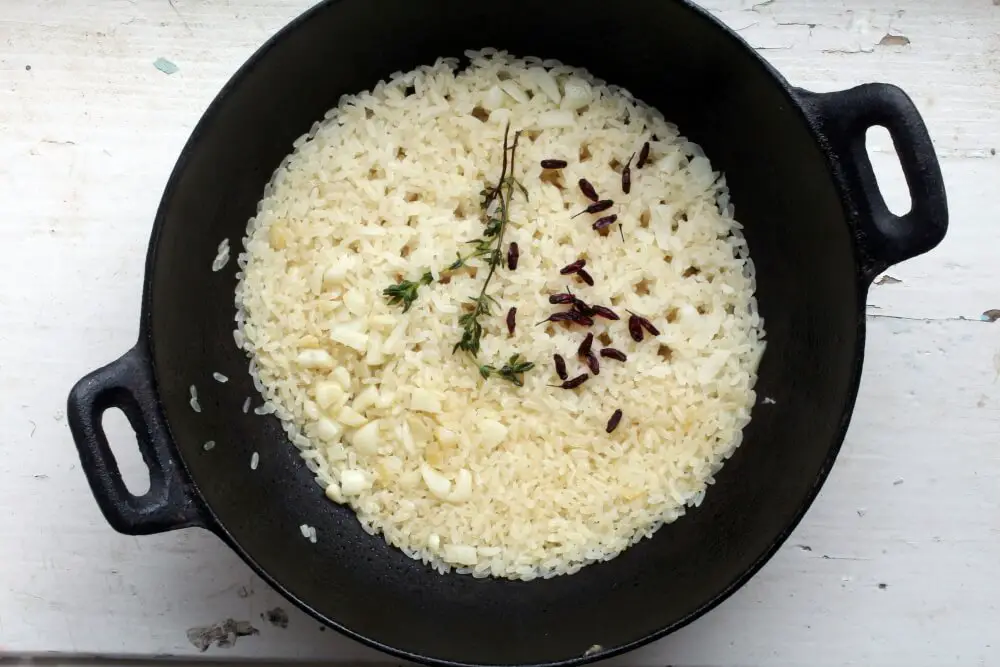
Fixing the boiling over issue is great, but what actually causes rice cookers to boil over?
Incorrect Rice-to-Water Ratio
Rice cookers can boil over if you use the wrong water-to-rice ratio.
Ensure you are following the instructions on your rice cooker. If this still doesn’t fix the issue, then try following the instructions for your specific kind of rice.
Rice Cooker Overfilled
If you add too much rice and water to your rice cooker, this could cause the rice cooker to boil over. Overfilling can make a rice cooker boil over simply because it can’t contain the amount of stuff inside.
It can also get starch on the seal of the rice cooker which can cause future problems.
Faulty Seal
If the seal on your rice cooker is damaged or faulty, then this will cause the foamy bubbles to leak out of the sides.
The seal might also just be dirty. Make sure you clean the seal of your rice cooker after every use to ensure a proper seal.
Heat Setting too High
If you cook your rice on too high of a heat setting, this can cause the water to boil over before the rice has a chance to absorb the water.
Rice should be cooked on a low heat setting so that the rice has time to absorb the water.
Wrong Type of Rice
Different types of rice grains contain more starch than others. If you have an issue with your rice cooker boiling over then you may want to try cooking a different kind of rice.
This could make all the difference you need to stop your rice cooker from boiling over.
Related Questions
Should I Stir Rice in a Rice Cooker?
You should not stir rice in a rice cooker. Rice cookers are designed to cook rice without stirring. Stirring rice can cause your rice to come out sticky. Once the rice is finished cooking, you can stir the rice to fluff up the rice before serving.
How Long Does it Take to Cook Rice in a Rice Cooker?
This depends on your rice cooker and the amount of rice you are cooking. But, rice usually cooks in a rice cooker in 20-30 minutes. Check the instructions for your rice cooker to get specifics or time your rice cooker to see how long it takes.

